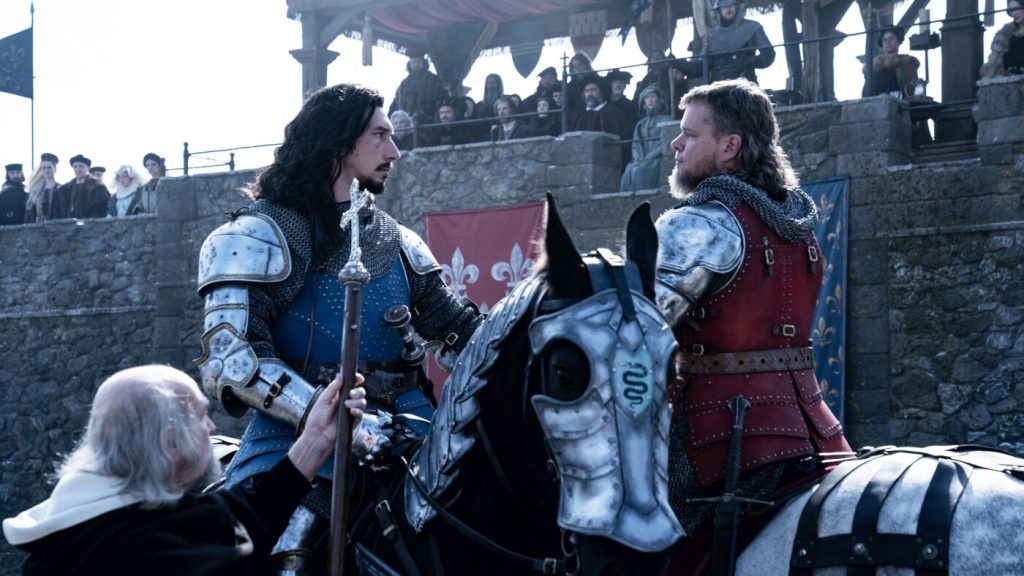Matt Damon and Adam Driver portray French noblemen who fight to the death in director Ridley Scott’s The Last Duel, which tells the true story of the last officially-recognized trial by combat in France during the 1300s.
But while the characters played by Damon and Driver wield their own brand of courage in standing up for what they believe, even if it means death for one of them, The Last Duel explores what courage really means by splitting its story into three distinct narratives. By the end, we’re presented with a vision of courage that challenges traditional notions of the archetypal warrior.
In the first act of The Last Duel, the story is presented through the eyes of Damon’s Jean de Carrouges. He’s a headstrong but heroic knight who leaps into battle to save lives despite orders to stand down. Carrouges represents the prototype of courage, like Russell Crowe’s character in Scott’s Gladiator: he takes the morally right path at every turn despite the challenges that lie ahead and the future harm it may bring him.
When Carrouges’ wife Marguerite (Jodie Comer) accuses his former friend Jacques Le Gris (Driver) of rape, he is quick to devise a plan of action to save her name. Because Le Gris has a higher standing with the local Lord (played by Ben Affleck) and other legal recourse won’t be effective, Carrouges challenges his former friend to trial by combat. God will decide the ultimate victor.
During the second act of The Last Duel, the same events are replayed from the perspective of Le Gris. While contemporary audiences will wince at Le Gris’ indefensible rape of Marguerite, the character is steadfast in his belief that the encounter was consensual. To save his name, Le Gris must also draw upon his inner strength to meet Carrouges on the battlefield.
Fully convinced of his own warped version of events, and left no alternative to preserve his honor, Le Gris too is portrayed in something of a courageous light as he enters a duel to the death with a more experienced combatant.
In the final act of The Last Duel, the story is told from the perspective of Comer’s Marguerite. For her, the rape by Le Gris is horrifying but the aftermath even more so: the decision to come forward with her account, knowing what consequences will come along with it, is an almost unbearable weight.
True courage is only witnessed during The Last Duel’s final version of events, told by Comer’s Marguerite. She takes the time to carefully consider what the morally right thing to do is, and then sees through a difficult action knowing the devastating consequences that come along with it.
There is no right. There is only the power of men.
– Nicole de Carrouges (Harriet Walter)
While Driver’s character is a clear villain and ultimately follows the wrong path, The Last Duel also questions the actions of Damon’s Carrouges, who would be presented as a prototype of heroism in most movies. He’s especially reminiscent of Maximus Decimus Meridius, Russell Crowe’s character in director Scott’s Gladiator.
But the same traits that made Carrouges a successful knight – aggression, fearlessness, and certitude of action – also make him another obstacle in Marguerite’s path she must confront to tell her story. In challenging the traditional the archetype of courage seen in many Hollywood films, The Last Duel redefines what it means to be truly courageous.
NEW! Put the principles from this article into practice with the free courage-boosting MaArtial app on the App Store for iOs and Play Store for Android.
[text-block-start]
If the three narratives of The Last Duel each depict a distinct form of courage, then the last and truest comes closest to representing the ideal of heroic courage as defined by the samurai’s Bushido Code.
The virtue of courage as defined by Izao Nitobe in Bushido: The Soul of Japan is distinct in that it features two distinct parts: recognizing what is the morally right thing to do in a particular situation, and then acting on that to ensure the right thing is done.
“Heroic courage is not blind,” Nitobe writes. “It is intelligent and strong.”
While recognizing the right thing to do in a particular situation may be easy for those with strong moral character, seeing that action through can often be a daunting task.
In order to give yourself a quick boost of courage in a difficult situation, we recommend breathing techniques that have been practiced for centuries and most recently applied by soldiers before entering combat. See our guide to “warrior spirit” breathing for more details.
[text-block-end title=”MaArtial comment”]












